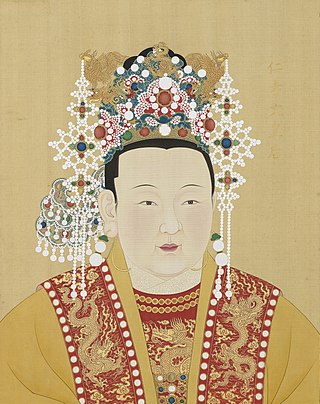See also
- Ming (surname) (明)
- Emperor Ming, multiple persons
Ming is a transliteration of multiple Chinese given names. Notable people with these names include:

Zhao is a Chinese-language surname. The name is first in the Hundred Family Surnames – the traditional list of all Chinese surnames – because it was the emperor's surname of the Song dynasty (960–1279) when the list was compiled. The first line of the poem is 趙錢孫李.

Huang is a Chinese surname that originally means and refers to jade people were wearing and decorating in ancient times. While Huáng is the pinyin romanization of the word, it may also be romanized as Hwang, Wong, Waan, Wan, Waon, Hwong, Vong, Hung, Hong, Bong, Eng, Ng, Uy, Wee, Oi, Oei, Oey, Ooi, Ong, or Ung due to pronunciations of the word in different dialects and languages. It is the 96th name on the Hundred Family Surnames poem.
Li Ming may refer to:

The Emperor in Han Dynasty, also released under the title The Emperor Han Wu in some countries, is a 2005 Chinese historical drama television series based on the life of Emperor Wu of the Han dynasty. It uses the historical texts Records of the Grand Historian and Book of Han as its source material.
The literary inquisition, also known as speech crime (以言入罪), refers to official persecution of intellectuals for their writings in China. The Hanyu Da Cidian defines it as "the ruler deliberately extracts words or phrases from intellectual's writings and arbitrarily accuse him in order to persecute him" ("旧时谓统治者为迫害知识分子,故意从其著作中摘取字句,罗织成罪"). The inquisition took place under each of the dynasties ruling China, although the Ming dynasty was particularly notorious for the practice. In general, there are two ways a literary inquisition could be carried out. First is that the conviction came from the writing itself. That is, the writing was the direct cause of the persecution. The second is that the writing was used as a tool to provide legitimate evidence for a predetermined conviction. Such persecutions could owe even to a single phrase or word which the ruler considered offensive. Some of these were due to the naming taboo, such as writing a Chinese character that was part of the emperor's personal name. In the most serious cases, not only the writer, but also their immediate and extended families, as well as those close to them, would also be implicated and killed.

Li Xian, courtesy name Mingyun, formally Crown Prince Zhanghuai, named Li De from 675 to 680, was a crown prince of the Chinese Tang Dynasty. He was the sixth son of Emperor Gaozong, and the second son of his second wife Empress Wu. He was known for writing commentaries for the Book of Later Han, the official history of the Eastern Han Dynasty. He became crown prince in 675 after his older brother Li Hong's death, but soon fell out of favor and generosity with Empress Wu herself and that's what caused his downfall. In 680, Empress Wu had her associates accuse Li Xian of treason, and he was demoted to commoner rank and exiled. In 684, after Emperor Gaozong's death, Empress Wu, then empress dowager, had her associate Qiu Shenji (丘神勣) visit Li Xian to force him to commit suicide.
The 16th Central Committee of the Chinese Communist Party was in session from 2002 to 2007. It held seven plenary sessions. It was set in motion by the 16th National Congress of the Chinese Communist Party. The 15th Central Committee preceded it. It was followed by the 17th Central Committee of the Chinese Communist Party.
Li Zhen, formally Prince Jing of Yue (越敬王), posthumously known during Wu Zetian's reign as Hui Zhen (虺貞), was an imperial prince of the Chinese Tang dynasty who, along with his son Li Chong, rose against Wu Zetian, then empress dowager and regent, as they feared that she was about to slaughter the Tang imperial Li clan. Both he and Li Chong were quickly defeated, however, and he committed suicide.

Empress Renxiaowen, of the Xu clan, was the empress consort to the Yongle Emperor and the third empress of China's Ming dynasty. She was well educated, compiling bibliographies of virtuous women, an activity connected with court politics.
Prince or King of Yan was a Chinese feudal title referring to the ancient Chinese State of Yan and to its fiefs including the capital Yanjing.
Zhao Ming may refer to:
Qi Pao is a Thai lakorn that aired on Channel 3. It features Ann Thongprasom as Paeka (Pink) and Krissada Pornveroj as Zhao Ming Tian.
Li Jindou is a Chinese comedian, sketch actor, xiangsheng performer, and professor of Chinese at Peking University. His disciples include Liu Ying, Ren Jun, Mao Wei, Han Bing, Liu Chang, Fu Qiang, Fang Qingping, Wang Zheng, Xu Qiang, Xu Mingzhe, Zhou Weixing, Xu Ming, Xue Xiaodong, Zhang Wei, Wang Qun, Shi Bufan, Yu Xuejun and Ma Qingjun.
Xia is the Mandarin pinyin romanization of the Chinese surname written 夏 in Chinese character. It is romanized Hsia in Wade–Giles, and Ha in Cantonese. Xia is the 154th surname in the Song dynasty classic text Hundred Family Surnames. As of 2008, it is the 66th most common Chinese surname, shared by 3.7 million people.

Dear Mom is a 2014 Taiwanese television series produced by Sanlih E-Television. Starring Ling Hung, Joanne Tseng, Albee Huang, Beatrice Fang, Shiou Chieh Kai, Melvin Sia, Duncan Chow and Jack Lee as the main cast. The Chinese title literally translates to "My Four Precious Daughters", which is in reference to the four main female characters of the drama. Filming began on December 1, 2014 and will be filmed as the drama aired. First original broadcast began December 16, 2014 on SETTV channel airing weekly from Monday till Friday at 8:00-9:00 pm.

The Seven Heroes and Five Gallants is a 1994 Taiwanese television series produced by Chinese Television System (CTS) a few months after its prequel Justice Pao, which was also produced by Chao Ta-shen. Dozens of actors appeared in both series, but only Sze Yu and Tu Man-sheng reprised their roles. Fan Hung-hsuan and Lung Lung chose to portray new characters rather than their iconic roles.

How Much Sorrow Do You Have, also known as The Real Warrior in some countries, is a 2005 Chinese historical drama produced by Beijing HualuBaina Film & TV Co. It was first broadcast on China Television in Taiwan in August 2005. In mainland China it was first broadcast on CCTV-8 in 2006. The title is directly taken from a poem by Li Yu, the protagonist of the drama.

Xu is a Chinese-language surname. In the Wade-Giles system of romanization, it is spelled as "Hsu", which is commonly used in Taiwan. It is different from Xu, represented by a different character.

Xu is a Chinese-language surname. In the Wade-Giles system of romanization, it is romanized as "Hsu", which is commonly used in Taiwan. It is different from Xu, which is represented by a different character.
Zhu Changxun (1586–1641) was the third son of the Ming dynasty Wanli Emperor. His mother, Noble Consort Zheng, was a favoured concubine and, in efforts to please her, the emperor attempted to have Zhu made heir apparent, but failed to overturn the rule of primogeniture. After the fall of the Ming, however, Zhu's son, Zhu Yousong, became emperor of the Southern Ming dynasty.